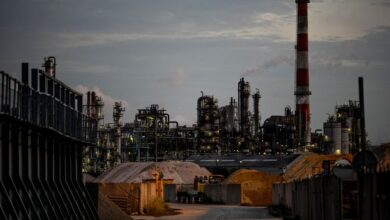Alcoa Corporation Faces Financial Strain Due To Tariffs Amidst Strong Quarterly Performance

$AA
Alcoa Corporation (NYSE:AA), a leader in the production of bauxite, alumina and aluminum products, is currently navigating a challenging financial landscape due to significant tariff impacts, despite reporting strong results for the first quarter of 2025. The company, known for its innovation and sustainability in the aluminum industry, has encountered increased costs stemming from the US tariffs on aluminum imports, particularly from Canada.
During the first quarter of 2025, Alcoa reported a notable increase in net income and adjusted EBITDA. The net income attributable to Alcoa Corporation surged to $548 million, a substantial rise from previous quarters, with earnings per share increasing to $2.07. This performance marks a significant recovery, considering the company faced a net loss in the same period the previous year. The adjusted EBITDA also saw a healthy increase to $855 million, up 26% sequentially, reflecting the company’s operational efficiency and the favorable market conditions for aluminum.
However, the financial uplift has been partially overshadowed by the costs incurred from the newly imposed tariffs. In the first quarter alone, Alcoa faced around $20 million in tariff-related expenses, with expectations of these costs rising to $90 million in the current quarter. The tariffs, which are part of the US Section 232 measures, impose a 25% duty on aluminum imports from Canada, where Alcoa has significant smelting operations.
The CEO of Alcoa, William Oplinger, highlighted that approximately 70% of their aluminum produced in Canada is destined for US customers, now subject to these elevated tariff costs. The ongoing tariff situation poses a substantial financial burden, as the company estimates an annual negative impact of approximately $100 million. This scenario complicates the financial outlook for Alcoa, which has been working diligently to manage its exposure to these tariffs through active engagement with global policymakers and customers.
These efforts, the full idle smelting capacity in the US cannot compensate for the shortfall, which totals 3.6 million metric tons, necessitating additional smelting capacity in the US to balance the supply chain efficiently. In response to these challenges, Alcoa has not only focused on navigating the tariff impacts but also on strategic partnerships and debt repositioning.
The company announced a joint venture with IGNIS Equity Holdings, SL, to support the continued operation of the San Ciprián complex in Spain. This partnership, effective from the end of March 2025, saw Alcoa taking a 75% interest and continuing as the managing operator. The financial structure of this venture includes significant contributions from both parties and highlights Alcoa’s commitment to maintaining its operational capabilities in Europe. Furthermore, Alcoa has been proactive in managing its debt portfolio.
In March 2025, the company successfully issued $1 billion in aggregate principal amount of senior notes, which were primarily used to settle existing debts. This strategic financial maneuver is part of Alcoa’s broader effort to optimize its asset portfolio and enhance financial flexibility amid fluctuating market conditions. As Alcoa continues to navigate these complex financial and operational challenges, the company remains focused on its long-term. The path forward for Alcoa involves not only adapting to the immediate financial pressures but also ensuring it remains at the forefront of the aluminum industry’s evolution.
**DISCLAIMER: THIS CONTENT IS FOR INFORMATIONAL PURPOSES ONLY AND SHOULD NOT BE INTERPRETED AS INVESTMENT ADVICE. INVESTING INVOLVES RISK, INCLUDING THE POTENTIAL LOSS OF PRINCIPAL. READERS ARE ENCOURAGED TO CONDUCT THEIR OWN RESEARCH AND CONSULT WITH A QUALIFIED FINANCIAL ADVISOR BEFORE MAKING ANY INVESTMENT DECISIONS.**


